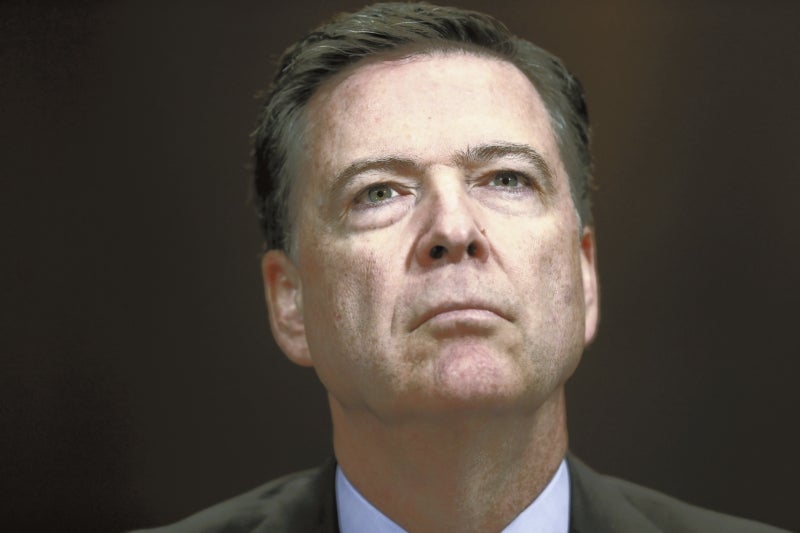Hugh Hewitt: Comey’s firing is pretty straightforward
Published 4:10 pm Wednesday, May 10, 2017

- In this May 3 file photo, FBI Director James Comey listens on Capitol Hill in Washington. President Donald Trump has fired Comey on Tuesday. AP Photo/Carolyn Kaster
Long ago and far away, when I was a young special assistant first to Attorney General William French Smith and then to Attorney General Edwin Meese, the young staff would automatically stand up whenever William Webster, then head of the FBI, walked into a room. At Friday morning round-table briefings in the attorney general’s massive conference room, when Webster spoke, everyone leaned in. He had the bearing, the competence and the character of the nation’s top and trusted cop.
Last summer an old D.C. hand took me to one of those Beltway places of lore for lunch and a cigar and talked candidly about how shocked he was at then-FBI Director James B. Comey’s decision to publicly discuss the Hillary Clinton email investigation and to walk the public through a hundred details of the case and then conclude she should not be prosecuted. Agree or disagree with that decision, he said, it’s not what the FBI does. Ever. Agents present facts to prosecutors. They may nudge or even push in one direction or the other, but they don’t decide.
My interlocutor, a former assistant U.S. attorney and then-senior official in numerous positions and companies, was not so much outraged by Comey’s actions at the time as puzzled, perhaps even shocked.
Apparently, new Deputy Attorney General Rod Rosenstein shared exactly that view and expressed it succinctly in his three-page memo to Attorney General Jeff Sessions. Confidence in the FBI would not come back until a new director was in place, and that, of course, requires that Comey be fired. Not a decision to be taken lightly, Rosenstein argued, but one he recommended that Sessions make.
Sessions reviewed the recommendation, concurred and forwarded a joint recommendation to the president, who agreed.
Anyone who thinks this is connected to a cover-up of “Russian collusion” has to believe that both Rosenstein and Sessions would participate in such a corrupt scheme. I don’t. It is, in fact, absurd to think that. Reread the Rosenstein memo — a few times. There’s the story. Comey was wrong in July, wrong in subsequent statements, wrong as recently as last week and refused to admit error. The story is a straight-line one, and it’s about Rosenstein.
In fact, just last week Comey said this in response to a question from Sen. Patrick Leahy, D-Vt., about whether Rosenstein should appoint a special prosecutor in the Russian investigations: “That’s a judgment he’ll have to make. He is, as I hoped I was as deputy attorney general, a very independent-minded, career-oriented person, but it’d be premature for me to comment on that.”
That’s Comey on Rosenstein. Last week. Under oath.
Which doesn’t mean that questions about the investigation of Russia’s attack on our election are any less serious or the need for a thorough inquiry into charges of collusion between Russia and anyone in the many circles of President Trump is any less pressing. It just means that the FBI has to be led by someone like Webster to assure that both sides of deeply divided D.C. accept the results of all facets of the investigation.
Moreover, at last week’s hearing Comey told Sen. Thom Tillis, R-N.C., that there are 2,000 investigations into would-be “violent extremists” — half home-grown and in the “lone wolf” category, the other half in contact with foreign organizations (of whom about 300 are immigrants to the United States). That’s a massive threat. The FBI is the chief bulwark against it as well as against all cybercrime from abroad (government-sponsored and private criminal activity) and organized crime at home. The director simply cannot lack the confidence of the deputy attorney general or the attorney general.
So whom to turn to? Most definitely someone in the Webster mold, which means a current or former federal judge of stellar reputation for both character and competence, and perhaps with some charisma that could prove useful in rallying the FBI and the Justice Department. Someone like J. Michael Luttig, former 4th Circuit judge and now-general counsel for Boeing; U.S. District Judge Richard J. Leon, who has handled scores of terrorism cases; or Stephen Larson, one of my law partners, a former federal judge and formerhead of the organized-crime division of the U.S. Attorney’s Office for California’s Central District. There are, in fact, plenty of superb candidates in the mold of these three that must bring stature and independence to the job.
But first we have to endure a few days of over-the-top takes from the always overwrought media. This isn’t the “Saturday Night Massacre.” There are no tapes, no subpoenas for presidential documents, no resignations from the Justice Department, but instead recommendations from the Justice Department. It’s four months into an administration, not four years. In short, the overwrought media has toppled into hysteria again.
Hugh Hewitt, a Washington Post contributing columnist, hosts a nationally syndicated radio show and is author of “The Fourth Way: The Conservative Playbook for a Lasting GOP Majority.”

